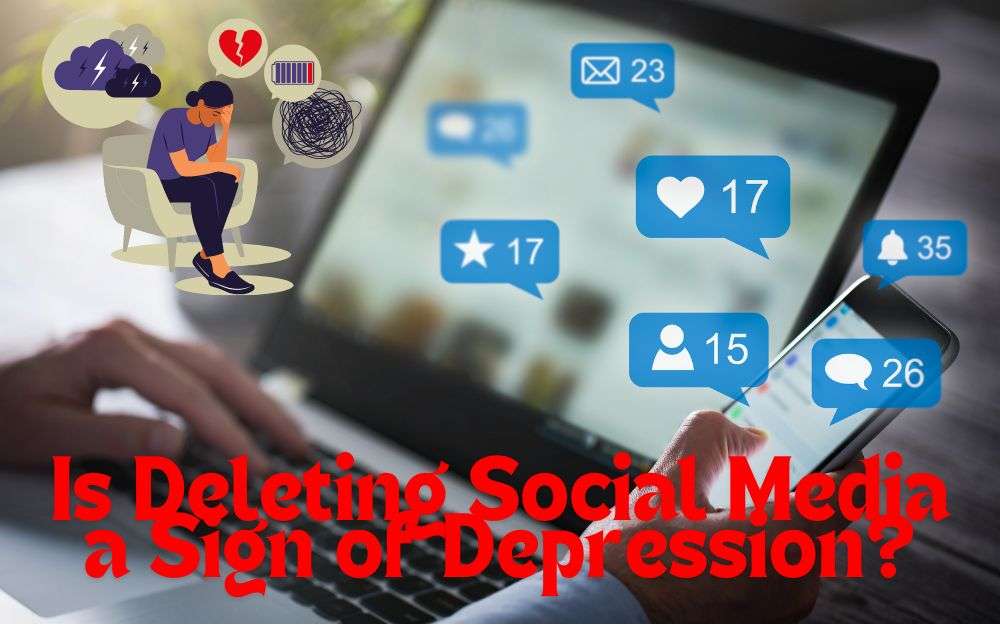Social media is more than simply a way for people to connect with friends and share pictures in the modern digital era. For billions of people worldwide, it is an ordinary part of existence. However, what occurs if someone chooses to stop using these platforms? Is Deleting Social Media a Sign of Depression? or a move in the right direction for one’s own wellbeing? We will talk about the rationale behind quitting social media, the possible connection to depression, and the potential effects on mental health in this blog.
Understanding the Reasons for Leaving Social Media
The Overwhelming Nature of Constant Connectivity
One of the most common reasons people choose to delete their social media accounts is the overwhelming nature of constant connectivity. Social media platforms are designed to keep users engaged for long periods. This can lead to a feeling of being constantly bombarded with updates, notifications, and messages. For some, this constant connectivity can become exhausting and overwhelming, leading them to seek a break.
Seeking Authentic Connections
Another reason some people opt to leave social media is the desire for more authentic connections. Social media often presents a curated version of life, where everyone seems to be having a great time, all the time. This can create feelings of inadequacy and loneliness. By stepping back from social media, individuals may seek deeper, more meaningful interactions in the real world.
Privacy Concerns
Privacy is another significant concern that might prompt someone to delete their social media accounts. With frequent reports of data breaches and concerns about personal information being misused, it’s understandable why some would choose to minimize their digital footprint.
The Link Between Social Media and Depression
The Impact of Social Comparison
Social media platforms are breeding grounds for comparison. Users often compare their lives to the idealized images and stories shared by others, which can lead to feelings of inadequacy and low self-esteem. Research has shown that this constant social comparison can contribute to depressive symptoms, especially among adolescents and young adults.
Cyberbullying and Online Harassment
Cyberbullying and online harassment are serious issues that can have profound effects on an individual’s mental health. Victims of cyberbullying are at a higher risk of developing depression. For some, the solution to escaping the negative interactions on social media is to delete their accounts entirely.
The Addiction Factor
Social media can be addictive. The platforms are designed to keep users engaged by using algorithms that stimulate the release of dopamine, a feel-good neurotransmitter. This can create a cycle where users feel compelled to check their accounts frequently, leading to anxiety and stress. For some, stepping away from social media is a way to break this cycle and improve their mental health.
Is Deleting Social Media a Sign of Depression?
A Step Towards Mental Health Improvement
Deleting social media is not necessarily a sign of depression. For many, it’s a proactive step towards improving mental health. By reducing the stress associated with online interactions and the pressure to be constantly available and perfect, individuals can focus more on their real-life relationships and personal growth.
When It Might Be a Concern
However, if the decision to delete social media is accompanied by withdrawal from other social activities, a persistent sadness, or a loss of interest in previously enjoyed activities, it might be a sign of depression. In such cases, it may be beneficial to consult a mental health professional for assessment and possible treatment.
The Impact of Quitting Social Media on Mental Health
Improved Focus and Productivity
Without the constant distractions of social media, many find that their focus and productivity improve. They have more time to engage in activities that they find fulfilling and enjoyable, which can boost overall happiness and satisfaction.
Enhanced Real-World Relationships
Quitting social media often leads to more time spent on real-world interactions, which can strengthen relationships with family and friends. These authentic connections are crucial for emotional support and can greatly enhance one’s quality of life.
Potential Feelings of Isolation
It’s important to note that for some, the absence of social media can lead to feelings of isolation, especially if their social circles are primarily online. It’s essential to find alternative ways to stay connected and maintain social relationships.
Finding New Interests and Hobbies
Quitting social media opens up a significant amount of free time that was previously spent scrolling through feeds and managing online interactions. This newfound time can be a golden opportunity to explore new interests and hobbies or to rekindle old passions that had been sidelined. Engaging in activities like reading, painting, cooking, or sports not only enriches life but also contributes to mental wellbeing. These activities can improve cognitive functions, reduce stress, and increase life satisfaction by providing a sense of achievement and purpose.
Affect on Physical and Sleep Health
The possible increase in sleep quality is a noteworthy advantage of putting social media down. The natural sleep cycle can be disturbed by the blue light emitted by screens, and it can be challenging to wind down and slumber due to the mental stimulation that comes with interacting with digital content. People who spend less time on screens, especially before bed, frequently have better sleep patterns, which is important for both mental and physical well-being.
Changes in Anxiety and Stress Levels
The decision to delete social media can also lead to a decrease in anxiety and stress. Social media often fuels a fear of missing out (FOMO), which can lead to constant anxiety about not being part of certain events or interactions. Removing oneself from this constant flow of information can alleviate these feelings, allowing for a more relaxed and peaceful mind. Moreover, without the pressure to keep up appearances and compete for likes and shares, there’s a significant reduction in the sources of stress.
Reclaiming Personal Identity and Self-Worth
Social media can significantly influence how people perceive themselves and their worth, often tying self-esteem to the number of likes, comments, and shares they receive. By disconnecting from these platforms, individuals have the opportunity to reclaim their personal identity and self-worth independent of external validation. This shift can lead to more stable and internally derived self-esteem, which is less likely to be impacted by the fluctuations of social media dynamics.
The Role of Digital Detox in Modern Life
Incorporating regular digital detoxes can help maintain the benefits of quitting social media. Even for those who choose not to delete their accounts permanently, taking periodic breaks can provide many of the same advantages, such as improved mental health, better sleep, and increased personal time. Digital detoxes encourage a balanced approach to technology, ensuring that it enhances rather than dictates the quality of life.
Challenges and Adjustments
While there are many benefits to quitting social media, the transition can also present challenges. The initial period after deletion might feel like a loss due to the abrupt disconnection from the social grid. Individuals might miss out on events or updates from friends and family initially felt only through online platforms. It’s important during this time to communicate with loved ones about other ways to stay in touch and to establish new routines that support personal and social needs.
Long-Term Outcomes
Over the long term, those who quit social media often report a greater sense of personal freedom and control over their lives. They may find themselves less swayed by trends and more thoughtful about how they spend their time and with whom they interact. The mental space cleared by removing oneself from the daily influx of social media content can lead to deeper self-reflection and personal growth.
Frequently Asked Questions (FAQs) About Deleting Social Media
1. Why do people decide to delete their social media accounts?
- People may delete their social media for various reasons including overwhelming constant connectivity, a desire for more authentic real-world relationships, privacy concerns, or to reduce stress and improve mental health.
2. Is deleting social media a sign of depression?
- Not necessarily. While deleting social media can be a symptom of depression if it’s part of a larger pattern of withdrawal, many people delete their accounts as a proactive step to improve their mental health and reduce stress.
3. What are the mental health benefits of quitting social media?
- Benefits can include reduced anxiety and stress, improved focus and productivity, better sleep quality, and enhanced real-world relationships. People often experience a significant increase in personal time and find new interests and hobbies.
4. Can quitting social media improve physical health?
- Yes, it can. Improvements in sleep patterns due to reduced exposure to screen light and less mental stimulation at night can lead to better physical health. People also tend to engage more in physical activities once they leave social media, which contributes to overall well-being.
5. What are the social implications of deleting social media accounts?
- Initially, individuals may feel isolated or out of the loop with events and social gatherings that are organized or discussed via social media platforms. However, many find that their real-world relationships become stronger and more meaningful.
6. How can someone handle the feeling of missing out after deleting social media?
- It’s helpful to stay connected through other means like direct messaging, emails, or regular gatherings. Also, focusing on and appreciating the benefits of a social media-free life can help mitigate feelings of missing out.
7. Are there any drawbacks to quitting social media?
- Some potential drawbacks include feeling out of touch with distant friends and family, missing out on event invitations or news updates, and initially feeling a loss of community. Adjusting communication methods and finding new ways to stay informed can help address these issues.
8. How long should someone try a digital detox before deciding to delete their accounts?
- Trying a digital detox for a period of about two to four weeks can provide a good sense of how life without social media feels and what benefits it might bring. This period allows enough time to observe changes in mental and physical health, productivity, and personal relationships.
9. What should someone do if they feel worse after deleting their social media?
- If someone feels worse after deleting social media, especially if feelings of depression or isolation persist, it might be helpful to talk to a mental health professional. It’s important to determine whether these feelings are directly related to the absence of social media or if they are part of a broader mental health issue.
10. Is it possible to return to social media after deleting an account?
- Yes, many social media platforms allow users to reactivate their accounts after a deletion. However, it’s important to return with a plan on how to manage usage effectively to avoid falling back into negative patterns.

Mohamed Adil, is a versatile blogger specializing in social media tips, bios, Shayari, guides, and informative content. With a keen eye for detail and a passion for writing, Adbuay offers valuable insights and engaging articles that cater to a diverse audience. Stay tuned for practical advice and creative inspiration from this talented author.

